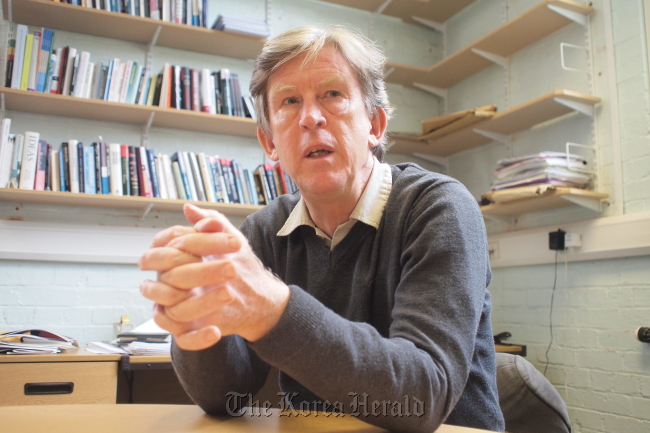Former BBC news editor emphasizes good reporting as cure for bad journalism
CARDIFF, Wales ― In the 1960s, the “British Invasion,” led by the Beatles and the Rolling Stones, conquered the U.S.
Fifty years on, Britain is still one of the largest music exporters in the world, behind only the U.S.
“The U.K.’s creative industries are very important. Britain is a bigger producer of creative industries goods like music and publishing and other things than any other European country,” said professor Ian Hargreaves, chair of Digital Economy at Cardiff University.
Propelling the competitiveness of the creative industry, he said, is a key element: a high degree of freedom of speech.
“That is absolutely indispensible for creative economy, and the U.K. also has the advantage of speaking the language which is widely adopted around the world, including the U.S.,’’ Hargreaves said in an interview with The Korea Herald at his office in Cardiff, Wales.
 |
Ian Hargreaves |
According to the professor, however, Britain’s more than 300-year-old copyright laws fail to address today’s ever-changing media landscape. Under existing laws, for example, it is illegal to upload music from a CD onto an MP3 player.
“Well, everybody is breaking the law,’’ he laughed.
The outdatedness of the laws not only makes them easier to break, but challenges the potential of the creative industry, he said.
“If the law does not change, the creative economy will underperform. I think we need to get the right balance between privacy and protection and public domain, and that balance at the moment is not in the right place,’’ he said.
After leading a five-month review of British intellectual property policy commissioned by British Prime Minister David Cameron, Hargreaves published the results last year in a report titled “Digital Opportunity: A review of intellectual property and economic growth.”
A key recommendation he includes is the launch of a Digital Copyright Exchange by the end of this year. A one-stop shop to facilitate the deals around copyrighted content, DCE is expected to be a solution to the issue of intellectual property rights concerning “orphan works,” whose original copyright owners are not traceable.
The professor, however, rejected the adoption of the American-style “fair use” doctrine, which allows use of copyrighted material without any defining parameters. The practice, however, is said to have been a driving force behind the growth of companies like Google and YouTube.
“The U.S. market is more openly contested than the British market because of the legal availability of the defense against copyright infringement, which allows you to go to court and say, ‘I know I copied this, but I believe I’ve not damaged the interest of the rights holder.’ And then the court sorts it out.’’
Such a system is beneficial because it doesn’t hinder innovation in the first place, he says, but has the disadvantage of being “an absolute paradise for lawyers.’’
“A lot of American analysts would say that the American arrangement involves a greater respect of free speech than the European and indeed other international traditions. But it’s a very distinctively American approach, and it’s not one, in my view, that we could realistically introduce here.’’
Also facing the challenges of the technologically evolving creative industry is the field of journalism, where an increasing number of traditional news organizations worldwide must endure financial hardships amid the rise of the Internet and new media technologies.
“I certainly regard journalism as part of the creative economy,’’ said the veteran journalist-turned-professor who has held editor posts at The Financial Times, BBC and The Independent.
But Hargreaves looks on the brighter side of the changes.
“At the moment we can see only old models breaking down. But there is more pluralism: there are more voices, there are more ideas and there are more challenges. Of course it’s possible to make an argument that the whole of professional journalism will be swept away, but I don’t believe that will happen,’’ said the professor.
The professor was recognized in this year’s Queen’s birthday honors list with a CBE, a top national honor, for his services to the creative economy and higher education.
Last December, he contributed to the Leveson Inquiry into the culture, practices and ethics of the press at the British Royal Courts of Justice regarding the phone-hacking scandal, in which journalists of Murdoch’s now-shuttered News of the World tabloid illegally hacked into the voice mail accounts of celebrities, politicians and murder victims in search of scoops.
“In the end, the cure for bad journalism is good journalism,” he said.
“That’s what you see here. The cure for the wicked journalism of the News of the World was not the police or parliament, or the regulator.’’
Despite all the controversies around the scandal, however, he made it clear that journalists should understand that there will be circumstances in which breaking laws is justified.
“The only ground on which you could make the argument is that the public interest is better served by me breaking the law. You have to do that as a journalist, knowing that you may well go to jail. That’s a part of what being a journalist is about.’’
Working as an energy correspondent for the Financial Times, he visited Korea quite a few times during the 1970s.
“The first time I went to Seoul, the pavement was made of dirt. But it was very clear at that time that the country had understood how to achieve a great level of prosperity and dynamism,’’ he said. “I remember I visited the motor industry in South Korea before anybody ever heard of the motor industry in South Korea. Now in Cardiff, the Korean motor industry is very strongly represented,’’ Hargreaves added.
By Lee Yong-sung, Contributing writer
(ohmydan2@yahoo.co.kr)








